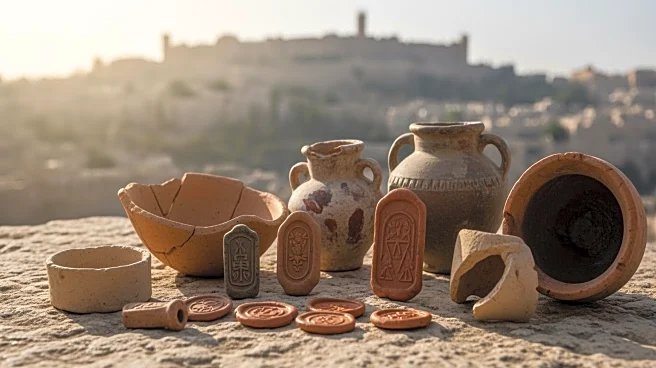What's Happening?
The City of David, an archaeological site in Jerusalem, has become a focal point for discussions about Jewish historical claims to the land of Israel. Doron Spielman, an author and advocate for the site, argues that the discoveries made there provide
strong evidence of the Jewish people's ancient connection to the region. Spielman, who served as vice president of the City of David Foundation, has published a book titled 'Let the Stones Speak,' which details these findings and their implications. The site has yielded numerous artifacts linking Jerusalem's earliest settlements to the biblical period, challenging theories that previously minimized the historical accounts of figures like David and Solomon. Spielman contends that these discoveries have not only fueled national pride but have also become a point of contention in international politics, particularly during the Obama administration, as they complicate narratives around the division of Jerusalem in peace negotiations.
Why It's Important?
The archaeological findings at the City of David have significant implications for both historical scholarship and contemporary geopolitics. By providing tangible evidence of ancient Jewish presence in Jerusalem, these discoveries bolster claims to the land that are central to Israeli national identity and political arguments. This has ramifications for peace processes and negotiations involving the division of Jerusalem, as the site is located in an area often discussed as part of a future Palestinian state. The findings challenge narratives that seek to undermine Jewish historical claims, impacting diplomatic relations and policy decisions. For many, the site is not only a symbol of historical continuity but also a testament to cultural and religious heritage, influencing both local and international perceptions of the Israeli-Palestinian conflict.
What's Next?
As archaeological work continues at the City of David, further discoveries could potentially reinforce or challenge existing historical narratives. The site's significance is likely to keep it at the center of political and academic debates. Future excavations may uncover more artifacts that could either support or complicate claims about the historical presence of Jewish people in Jerusalem. Additionally, the site's role in diplomatic discussions may evolve, particularly as international stakeholders, including the U.S., engage with the complexities of Middle Eastern geopolitics. The ongoing exploration of the City of David will likely continue to influence both scholarly research and political discourse.
Beyond the Headlines
The City of David's archaeological findings also raise questions about the role of historical evidence in shaping national identity and international policy. The site's discoveries highlight the intersection of archaeology and politics, where historical narratives are used to support contemporary claims. This underscores the broader ethical considerations of how history is interpreted and utilized in geopolitical contexts. The site's impact extends beyond Israel, resonating with global audiences who view it as a symbol of religious and cultural heritage. As such, the City of David serves as a reminder of the enduring power of historical narratives in shaping modern political landscapes.
















